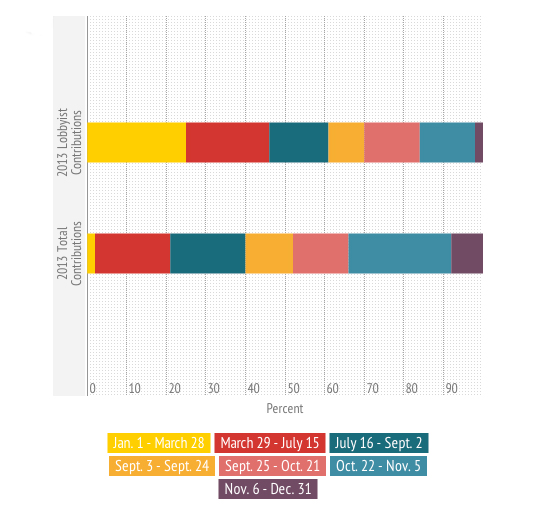Chart of the Week: Breaking Down the Lobbyist Money in Boston’s Elections
Lobbyists registered with the state of Massachusetts give a lot of money to politicians, but usually focus their funds on the statehouse lawmakers who they deal with most. In 2013, however, they could not ignore the importance of Boston’s city elections in which voters chose a new mayor and several new members of the City Council.
In all, those registered lobbyists contributed nearly $130,000 to candidates on Boston’s municipal ballots last year, according to my analysis of disclosures filed with the Secretary of the Commonwealth. More than two-thirds of that went to mayoral candidates.
That’s still just a fraction of more than $1 million those lobbyists gave altogether (I’ll break down the rest of that booty in future posts).
But it’s still a lot when you consider that lobbyists may give no more than $200 to any individual candidate in a calendar year.
This chart shows you who got how much of that lobbyist loot. As you can see, their favorites tended to end up as winners—but the causation is in large part in the reverse direction. Lobbyists usually like to curry favor with those they expect to be dealing with in office. Thus you saw money flowing to the frontrunners in the mayoral race and to incumbents in the City Council—along with newcomers Michelle Wu and Josh Zakim, who were perceived as likely winners of open seats:
Walsh’s lead with lobbyists was not, however, solely attributable to bandwagon-jumping. As an influential state representative, he already had good relationships with them. In fact, he had already raised quite a bit from them before anybody knew that there would be an open mayoral race.
The graph below shows when Walsh’s lobbyist contributions came in, compared with his overall fundraising. The first time-period is prior to Tom Menino’s announcement that he would not run for re-election. The next covers the early stages of the campaigns—up to the mid-July release of a poll showing Walsh and John Connolly in the leading positions. The third period goes from then until Labor Day—the traditional start of serious campaigning—followed by the final stretch to Walsh’s victory in the September 24 primary. Then there’s the first weeks of the general election; the final two weeks, as Walsh took the lead in polls; and finally the post-election period, when some people were offering donations as a peace offering after backing the wrong horse.
Few lobbyists waited until after the fact, though. Compared with others, they were early onto the Walsh bandwagon—for whatever that proves to be worth.

Created with infogr.am


